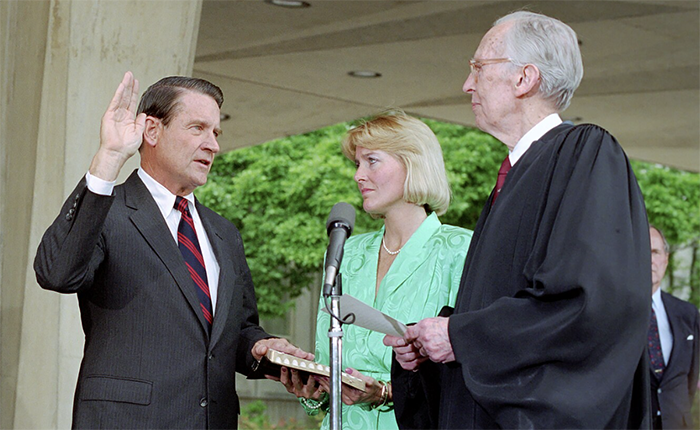He warned us, now he's gone
An American hero and servant leader, dies at 101
It shouldn’t really be a surprise when a centenarian dies. Yet, for the few I’ve known personally, the math and logic behind the short time they have left has collided with the magical thinking that they may live forever — after all, they’ve outlived just about everyone else!
That’s how I felt about my friend William Webster — the only person to serve as both Director of the CIA and Director of the FBI, among many other important roles appointed by Republican and Democratic presidents — who died yesterday (Friday, August 8, 2025) at the age of 101.
Many long-form obituaries have already been written (here is a gift link to the one in the New York Times), so I will not attempt to do that here. But I did notice, what to me is, a glaring omission: In early 2025, his final act of public service was working tirelessly to warn Senators not to confirm Kash Patel and Tulsi Gabbard to be Directors of the FBI and National Intelligence, respectively.
Together, we attended a confirmation hearing and wrote many letters to each Senator, imploring them to protect our federal law enforcement and intelligence communities from leaders seeking a president’s retribution.
Here is an excerpt from his letter:
When leaders of [the FBI and Intelligence Community] become too closely aligned with political figures, public confidence erodes and our nation’s security is jeopardized.
In my ten years at the FBI, I was contacted by the President only twice. On both occasions, the interactions underscored the importance of maintaining the FBI’s independence. President Carter once asked me to investigate a matter, to which I responded, “Mr. President, if the FBI has jurisdiction, we will act. If not, I hope you will understand that we cannot get involved.” President Carter replied, “Absolutely. I would not want the FBI to operate any other way.” Similarly, President Reagan’s request for assistance with the First Lady’s security during a visit to the UK involved collaboration, not interference, ensuring the integrity of the agency’s work.
I am deeply concerned about the potential nominations of Mr. Kash Patel to lead the FBI and the inclusion of Former Congresswoman Tulsi Gabbard as DNI in intelligence roles. While Mr. Patel’s intelligence and patriotism are commendable, his close political alignment with President Trump raises serious concerns about impartiality and integrity. Statements such as “He’s my intel guy” and his record of executing the president’s directives suggest a loyalty to individuals rather than the rule of law — a dangerous precedent for an agency tasked with impartial enforcement of justice.
Congresswoman Gabbard’s profound lack of experience in the intelligence community and the daunting task of overseeing 18 disparate intelligence agencies further highlight the need for seasoned leadership. Effective management of our intelligence community requires unparalleled expertise to navigate the complexities of global threats and to maintain the trust of allied nations. Without that trust, our ability to safeguard sensitive secrets and collaborate internationally is severely diminished. As someone who transitioned from the FBI to the CIA, I can attest to the steep learning curve even for a seasoned professional. This is no time in world history for a novice in the field to learn this role.
Of course, anyone paying attention since Patel and Gabbard were confirmed knows these warnings weren’t hyperbole, and weren’t enough for a majority of senators. But I think it’s worth noting that Judge Webster’s efforts were neither partisan nor born of his distaste for the president. He would have written the same letter about nominees of any president, from any party who promised to bend these institutions to the whims of the executive.
The letter to Senators concluded with:
Every president deserves appointees they trust, but the selection process must prioritize competence and independence to uphold the rule of law. As you consider these and future nominations, I urge you to weigh the critical importance of nonpartisan leadership and experience. The safety of the American people — and your own families — depends on it.
I feel blessed to have worked alongside him and his wife Lynda in that effort, and mourn not just the man, but the principled servant leadership that stood above partisanship — an even more endangered virtue today.
Thank you for your service to our nation and world, sir. You’ve earned your rest.
📎 You can read Judge Webster’s Letter to the Senate in its entirety here:




A beautifully written piece to memorialize and honor Judge William Webster. Thank you for this wonderful writing and I hope someone somewhere will carry forward Judge Webster’s profound legacy and love for our country. 🙏🏻
Thank you for this glowing tribute to, and appreciation of, an American patriot, whose loyalty was to his country and not to parties or personalities.
It's unfortunate that his audience didn't share those attributes.